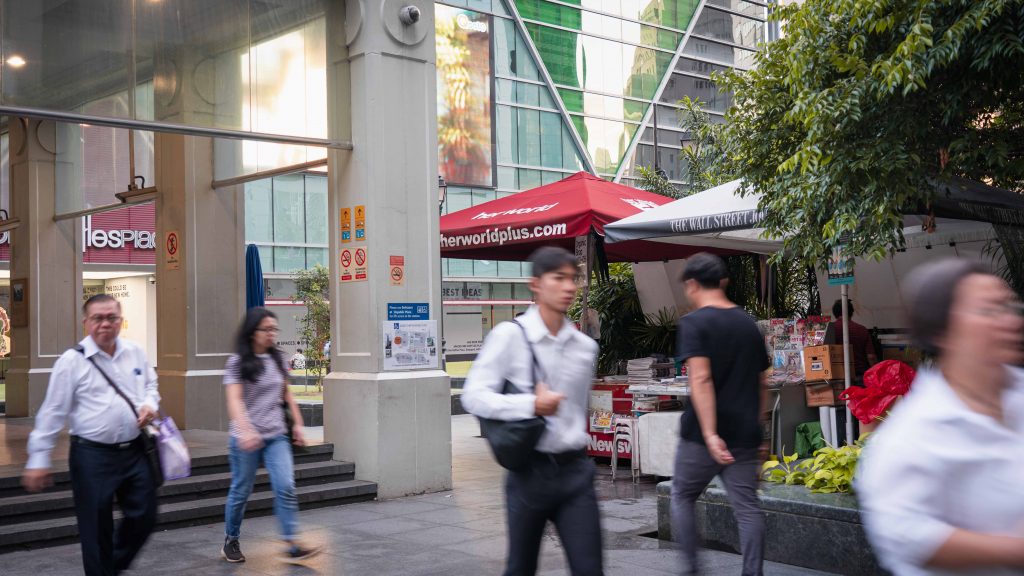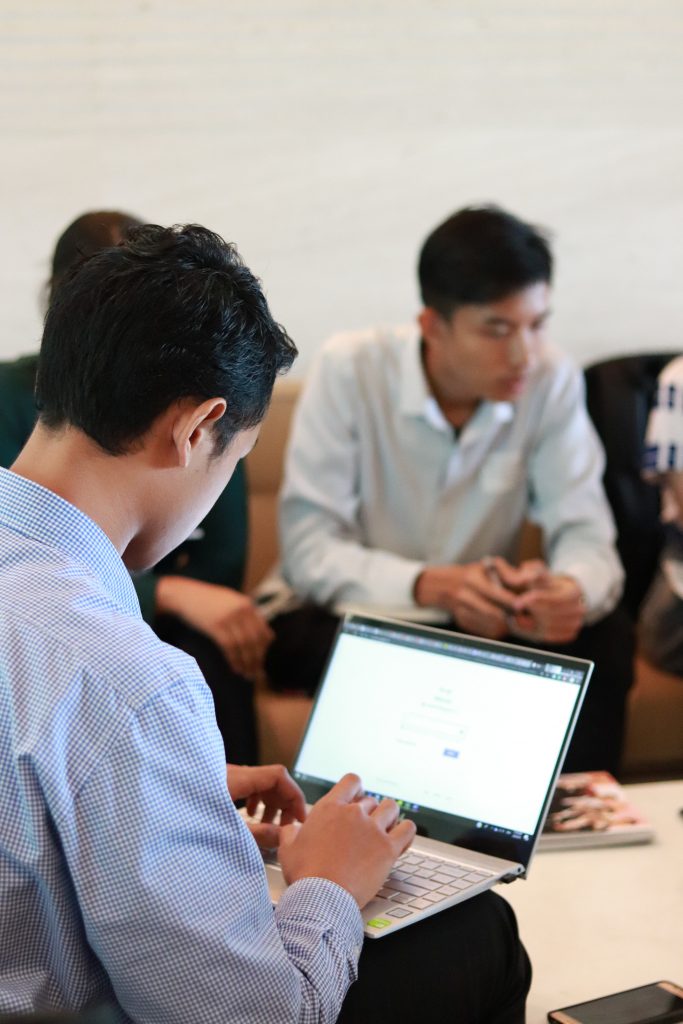All interviewees have had their names changed at their request.
The other is to quit your stable, full-time job during a pandemic that has ravaged the economy, leading to the loss of thousands of jobs. In fact, just today (14 September), The Straits Times reported that “Retrenchments in Singapore more than double to 8,130 in Q2”.
Yet, it seems that each week I hear about someone who has resigned without a new job offer in their pocket. These anecdotes grew so frequent that I couldn’t help but poke around and ask: What on earth was going through these people’s mind?
Why are they tendering their resignations now, in the worst economy Singapore has experienced in over a decade?

Sebastian decided to quit his job because of, not despite, the pandemic.
Granted, his reasons for leaving were not specifically caused by the pandemic: he struggled to find meaning in his work, lacked confidence in the way his company was run, and had no work-life balance.
But the pandemic, and the circuit breaker it instituted, threw these shortcomings into sharper relief.
Many of us see working from home as a silver lining of the pandemic. We get to wake up ten minutes before work officially starts; we save on commute time and fees; we can wear comfy pyjamas while typing an email to the director of a statutory board.
For Sebastian, however, working from home made him more discontented with his job.
With telecommuting’s “bigger emphasis on getting the job done rather than being in the office,” Sebastian realised that being in the office and bouncing ideas off his “gam colleagues” formed a large part of why he enjoyed his job the past two years—not because of the work he was doing per se.
As he puts it, “the pandemic has stripped the job to the work itself … and exposed the mundanity of [my] work”.
Another thing that the pandemic has stripped was the polished veneer of his company.
“There was a lack of transparency,” Sebastian gripes. “We had no update on how the company was doing during this period.”
Sebastian and his colleagues “only knew their company wasn’t doing too well” because they found out—without any official communication from the management—that people were leaving and being laid off.
Eventually, these factors made his situation so unbearable as to “incentivise him to find something else outside,” Sebastian concludes.
The pandemic has stripped the job to the work itself … and exposed the mundanity of work.
“Even if I don’t get something soon, it’s good to take a break,” Sebastian replies. “I’d rather take that break than spend another two months here feeling upset.”
Sebastian admits that this is a privilege afforded to him because he has no financial liabilities and enough savings to tide him through these months. Moreover, his parents were supportive of his desire to leave his job—which surprised me.
Hearing the disbelief in my voice, Sebastian explains, “My parents actually have a traditional mind-set. In any other normal working condition, they would have asked me to think twice, or at least get a job, before quitting.”
But now that Sebastian has been spending all his time at home working, his parents could witness, first-hand, how his working hours regularly stretched till 2 AM in the morning; his weekends weren’t spared from work, either.
To Sebastian, these were conditions that came with the territory of working in an agency.
Seeing his parents’ concern at his unhealthy working hours, however, made him realise that they were unsustainable and detrimental not just to himself, but his relationships with his family.
And so, Sebastian tells me with an embarrassed chuckle, the first thing his parents said when he tendered was: “Finally!”
“Quitting my job actually gave me a fresh perspective. At the end of the day, our mental well-being and future should take priority over job security. Those are things that cannot be compromised.”

Unlike Sebastian, Amy, who is currently working as an in-house legal counsel, had no quibbles with her company. In fact, she gushes that she “had a great time at her organisation” because of a “stable role and lack of problems and uncertainties”.
Why, then, did she tender her resignation now?
“Working from home was getting monotonous. You’re doing the same thing over and over again in the same place day in and day out,” Amy answers.
In other words, like Sebastian, the pandemic-induced work-from-home situation opened Amy’s eyes to how mundane her work was. Therefore, to get out of the rut in which she found herself, Amy decided to resign as a legal counsel so that she could hone her skills and take up a job in private practice.
Some context: as a law graduate from the UK, Amy has to sit for two parts of the Singapore Bar Examinations before she can be admitted as an advocate or solicitor of the Singapore courts.
As the Bar Examinations are full-time courses—that is, candidates are prohibited from being employed while undertaking the course—Amy had no choice but to leave her job so that she can enroll in this year’s Bar Examinations held across November and December, she justifies.
Well, that’s not entirely true.
“If I wanted to play it safe I would have just renewed my contract in the middle of the pandemic,” Amy acknowledges. “I could do the exam next year.”
That thought constantly haunts her. At times, Amy is unsure if she made the right decision forging ahead with the Bar Examinations right now, when everyone in the legal industry is struggling.
“I applied to so many law firms … but no one replied after 2 to 3 months. I would call the companies to ask about their job posting, and they would tell me, ‘Actually, we’re not hiring anymore. The posting is outdated.’”
She sighs: “Of course I’m worried.”
Still, for the sake of her career progression, Amy believes that she should not delay pursuing new opportunities that would benefit her in the long run.
“For me to be in a legal counsel role, that’s a bit slow for me, career-wise. I want to be at the forefront of things. It’s not time to play it safe.”

Darren is the modern-day Singapore salaryman. He has been in the same job all his adult life: for the past 6 years, he has spent more than 10 hours a day at his desk in a statutory board.
His dedication to his work has not gone unnoticed by his bosses. Darren has been steadily promoted up the ranks; he reckons that he would have been made Assistant Director soon—had he not tendered his resignation last month.
“I know people will think I’m crazy, throwing away an iron rice bowl when …”
“… when there’s no rice left,” he finishes, laughing at his own failed metaphor.
Then the smile leaves as suddenly as it had arrived, and he turns serious: “To be honest, I would have trundled happily along in my job for the next ten years. I was good at what I did, I liked my colleagues, and I had a good relationship with my director.”
Darren, in other words, is one of the lucky, steady few people for whom the thought of resigning from their job has never crossed their mind.
Until the pandemic happened.
“It was like a wake-up call for me,” Darren reflects. “I started to think—what if I got Covid and died in two weeks? How would I want to spend my time and be remembered?”
He realised he didn’t want to be remembered as the middle-management civil servant writing reports and being the last to leave his office. So he became the first, during the pandemic, to leave permanently.
[Covid] was like a wake-up call for me.
But Darren took all of that in his stride.
“At the end of the day, this whole Covid thing has taught me that I should do what’s meaningful to me. Not what’s meaningful to other people,” Darren says.
Darren shares that he recently had his first proper sit-down dinner with his parents. That hadn’t happened in years. He picked up knitting again—a hobby which he was willing to divulge only after persistent needling by me (“It’s not very manly.”). With an embarrassed grin, he reveals that he is also “back on the dating apps” after a long hiatus.
These are undeniably positive changes, but couldn’t Darren have made them without quitting his job?
He answers flatly: “No. My work takes too much out of me.”
What about money?
“My life was literally work, home, work, so I didn’t spend much,” Darren says. “And, you know, civil service. So I have a comfortable amount of savings.”
Besides, it’s not that Darren is planning to rest on his laurels and search for another civil service job once his money runs out. On the contrary, he plans to use his savings as capital to start his own business—in a field that he is truly passionate about.
“Maybe a shop that sells customised amigurumi [stuffed knitted figurines] … In the meantime, I might open an Etsy shop for my hobby,” he says, only half-jokingly.
“Even if it doesn’t make me roll around in money, I know it’ll make me feel that it’s time well spent. I don’t want to say I can die happy with that, but it’s definitely better than dying in my previous job.”

A Reddit thread entitled “Anyone here want to quit their job during the coronavirus?” attracted 223 comments, ranging from the encouraging (“I quit my job today, and I don’t have a job lined up. I quit because my mental health is 100% more important.”) to the cautionary (“Yes, I’d love to quit my job, but these are really uncertain times. Hold on the income and when this blows over start applying.”).
A survey conducted among Hong Kong workers in May 2020 also found that 49% of respondents planned to leave their job. More significantly, 41% citied the Covid-19 pandemic as a push factor for this decision.
Specifically, for Sebastian, Amy, and Darren, the pandemic made them realise that work should not form such a core part of their identity. Neither was it worth shackling themselves to an unhealthy environment for the sake of money.
Still, all of them recognised the rare privilege of being able to resign so easily during this difficult time. Certain qualities give them this freedom: they are young and single, without a family to support or a mortgage to pay, and they were in relatively well-paying jobs prior to resignation. Moreover, they stressed that this was not a decision they have undertaken frivolously.
While speaking to the three of them, I got a sense of how it was almost a moral dilemma they had to struggle with. Is it ethical to quit your job when so many are hungry for one? When the older and lower-income amongst us, or those in industries badly hit by the pandemic, would not be able to afford this luxury, even if their mental health is similarly suffering?
This self-reflexive questioning, I think, reveals how much moral weight Singapore society places on full-time employment. This sentiment is not particular to Singapore, but our social policies that downplay welfare and emphasise self-sufficiency give rise to the widespread perception that anyone who quits their job or remains unemployed for extended periods is an irresponsible free rider.
Indeed, Charlotte Cowles, the financial advice columnist at The Cut, agrees that “quitting your current job won’t solve your problems—it will just create different ones that seem more manageable to you.”
But she also believes that “you shouldn’t have to torture yourself for a paycheck”.
“It can be incredibly life-affirming to realise that a job isn’t just something you have to ‘get through’ because you think it’s the best you’re going to get,” she concluddes.
That’s precisely what Sebastian, Amy, and Darren have learnt from the pandemic: as long as they have a plan for their future and put in the effort to realise it, they can still lead a fulfilling life even after leaving their jobs.
And they have shown that Singapore youths are hungry—contrary to what a certain business owner who made the news lately claimed. They are hungry for life.





